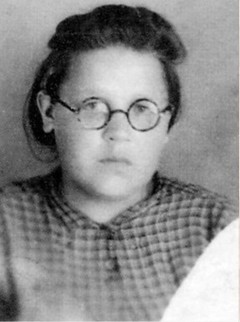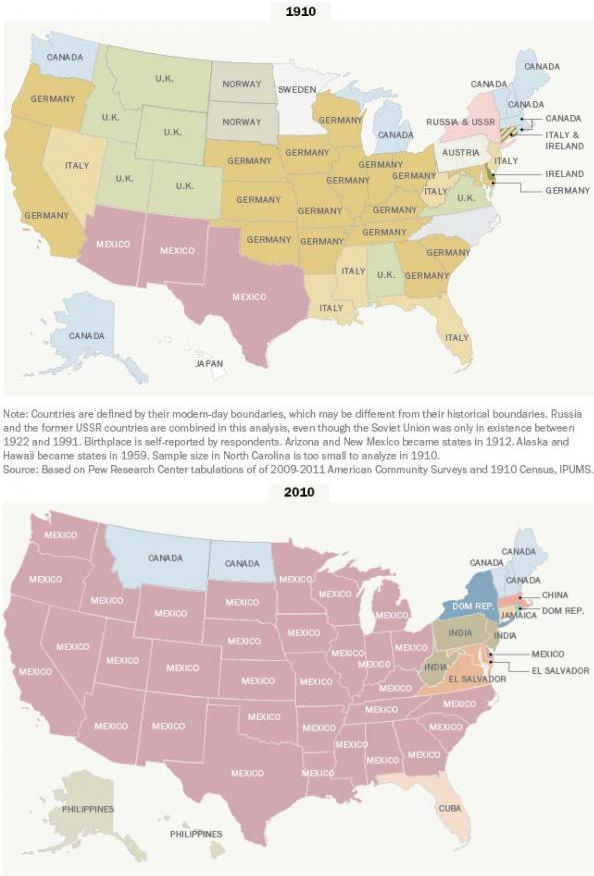In a world of universal deceit, telling the truth is a revolutionary act." George Orwell --
Saturday, June 28, 2014
Thursday, June 19, 2014
Wednesday, June 18, 2014
Tuesday, June 17, 2014
I understand what I'm saying in this video sounds a little bit harsh but its a hell of a lot better than being hurt or killed. Please share!
Simple Safety Tips to Avoid a Truck Accidents
How to Drive Defensively to Avoid Truck Accidents
Semi trucks, tractor-trailers, and other large vehicles are notoriously hard to maneuver, adjust, and brake in emergency situations. Therefore, when a truck must stop, swerve, or move quickly, the chance that the entire rig may roll-over, jackknife, or skid is immeasurably increased. However, you can help decrease these accidents while protecting yourself and family by driving defensively and cautiously around trucks and large vehicles. These tips will help.
- Remember that if you can’t see a truck’s side mirror, than the trucker can’t see you.
- Keep at least two car lengths between you and the truck at all times.
- Do not attempt to pass a truck on the right or before he changes lanes; he may not see you nor be able to adjust his speed to compensate for your passing.
- When approaching on-ramps next to a truck, be aware of the on-ramp traffic. If a car is trying to merge, make sure you allow room for the truck to move over if necessary. Just because you’re in the left lane doesn’t mean you don’t have to pay attention to on-ramps and traffic in the right. Although you may not think onramp traffic is your concern, since it’s the truck that has to adjust, if the trucker doesn’t see you in the left lane and has to move over, you’re the one who could be in danger.
- Remember to be cautious and respectful of other drivers, even if it’s for your own safety.
- Be extremely cautious when approaching semis in intersections. Make sure you see them and they see you.
- It’s much harder for a semi to adjust speed than it is for you. If an adjustment has to be made, do it yourself rather than waiting for the truck driver; not only will it be safer, but probably faster and less stressful as well.
- The safest way to drive around trucks is to make sure that they don’t have to readjust their speeds or trajectory because of you. You can drastically decrease the potential for a truck collision and make it easier for truckers to stay on the road by driving defensively and respectfully.
Unfortunately, no matter how safely or defensively you’re driving, you can’t control the actions of others. Therefore, if other drivers (truckers or not) don’t know or refuse to follow the proper truck safety guidelines, you and your family could be at risk for a serious accident. Don’t allow ignorance to hurt your family; help us spread the word by sharing this page on Facebook, Twitter or at work to raise awareness about truck safety.
Post by Dan Brooker.
I understand what I'm saying in this video sounds a little bit harsh but its a hell of a lot better than being hurt or killed.
Please share!
On June 6, 2014, a sedan with a passenger pulled out in front of a semi, disregarding the stop sign at the intersection of Highway 234 and State Road 63, in Vermillion County, Indiana, causing a destructive collision. A witness on the scene reported that the driver of the car that caused the collision, was talking on his cell phone at the time of the accident. Officials reported that the semi had a right of way when the collision occurred. While the driver of the semi was not injured, the car was damaged to the extent that both the driver and his passenger had to be extricated from it. Both were airlifted to Methodist Hospital by Lifeline, where the driver, who tested positive for marijuana, was pronounced dead. The passenger of the vehicle was hospitalized in a critical condition. Source: WDTVITV
Comments are closed.
Monday, June 16, 2014
Thursday, June 12, 2014
Socialist Workers' Party England: Support our Firemen.
Socialist Workers' Party England: Support our Firemen.: The SWPE today took to the picket line alongside the men and women of the Fire Brigade. Firemen and Firewomen risk their lives every day to...
In an act of unspeakable greed, the UK government is forcing Firemen and Firewomen to pay a substantial proportion of their pay into a pension scheme which requires them to work in a very dangerous job until they are 60 years old. If they should retire before they reach 60, they will only receive a pension at half the promised full rate.
The government is stealing from our Fire Brigades. Firstly, they are paid a pittance for what they do. Secondly, they are being forced to pay a far higher percentage of their pay than anyone else - effectively cutting their pay. Thirdly, due to the harsh working conditions, the vast majority of the Fire Workers will be forced to retire before they can receive a full pension, thus losing half their money. This is despicable.
In an act of unspeakable greed, the UK government is forcing Firemen and Firewomen to pay a substantial proportion of their pay into a pension scheme which requires them to work in a very dangerous job until they are 60 years old. If they should retire before they reach 60, they will only receive a pension at half the promised full rate.
The government is stealing from our Fire Brigades. Firstly, they are paid a pittance for what they do. Secondly, they are being forced to pay a far higher percentage of their pay than anyone else - effectively cutting their pay. Thirdly, due to the harsh working conditions, the vast majority of the Fire Workers will be forced to retire before they can receive a full pension, thus losing half their money. This is despicable.
The Diary of Lena Mukhina: An Important Document on the Leningrad Blockade (1941-1944) by Germany’s Wehrmacht
. . . . . Lena’s diary begins in May 1941 and ends in late May 1942, when she was evacuated from Leningrad. At the beginning of the diary, the reader is introduced to an introverted, 16-year-old girl. Lena lives with her aunt Lena and Aka, a family friend, in a communal apartment in Leningrad. The family is poor and survives mainly by borrowing money. Lena has few friends at school and is unhappily in love with Vova, a boy in her class. Despite her efforts to be a “good Soviet schoolgirl,” her grades are not very good.
The tone of the diary changes abruptly on June 22, 1941, when the Nazis invaded the Soviet Union. Like millions of other Soviet citizens, she hears the speech of Foreign Minister Molotov on the radio. Stalin, shocked by the Nazi invasion he had failed to anticipate despite numerous warnings, would not make a statement until two weeks after the outbreak of war.
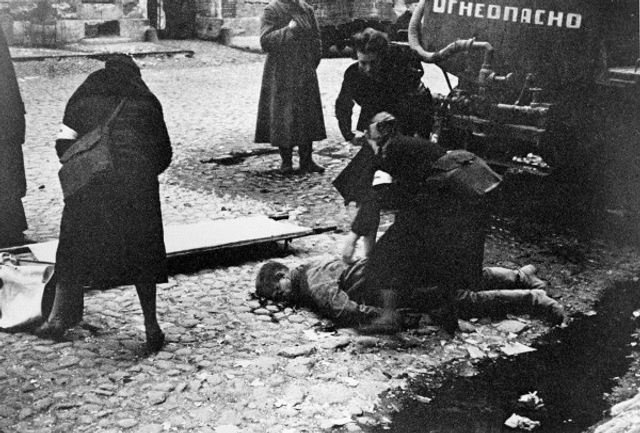 Nurses assisting the wounded during the first bombardment
Nurses assisting the wounded during the first bombardment
On June 23, Lena notes that the population is unprepared for war. She writes:
“To tell the truth, neither we nor any of the people in our block of flats are ready to deal with an attack: We don’t know where to find a medical aid centre, a decontamination site, an air-raid shelter; we don’t know where there are any air defence units or how we are supposed to react to bombing raids and firebombing.” [p. 53]
Only a few weeks before the war began, Lena had recorded her thoughts about Soviet military exercises in her diary: “Day
after day, soldiers are training with their commanders, and when the enemy attacks us—and that’s bound to happen, sooner or later there’ll be war—we can be absolutely sure of victory. We know what we’ll be defending, how we’ll be defending it and who we’ll be defending.” [p. 42]
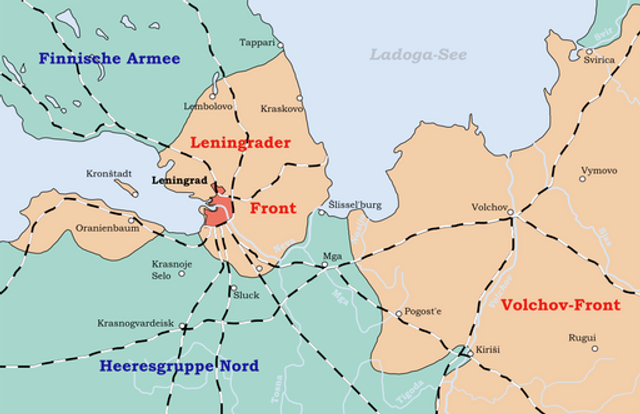
In fact, the Soviet Union was far from being militarily prepared for the attack. Much of the leadership of the Red Army had been exterminated in the Great Terror of 1937. Most of the victims had been trained and educated under the leadership of Leon Trotsky, who led the Red Army from 1919 to 1924. Stalin decimated the country’s military leadership–much to Hitler’s delight.
Hitler’s assumption of power in January 1933 was a result of the false policies of the Stalinist bureaucracy. The ultra-left course it imposed on the German Communist Party prevented a united struggle of the German working class against the Nazis and made Hitler’s victory possible.
In the months that followed, the Stalinist bureaucracy swung to the right and adopted the disastrous strategy of the “Popular Front.” A struggle for socialism via the revolutionary mobilisation of the working class was explicitly rejected. Instead, workers in Spain and France were to limit themselves to supporting bourgeois democracy against fascism.
The result was further devastating defeats. At the same time, tens of thousands of Trotskyists and hundreds of thousands of other socialist workers and intellectuals were murdered in the Soviet Union.
In 1939, Stalin entered upon a pact with Hitler, believing it would prevent a German attack on the Soviet Union. In reality, the pact paved the way for the German invasion of Poland a week later.
While Leon Trotsky laboured incessantly in exile to warn of a Nazi attack on the Soviet Union, the Stalinist bureaucracy was set on lulling the population into a false sense of security.
For Lena, as for millions of workers, intellectuals and peasants, the attack on the Soviet Union came as a shock. The Red Army was forced into retreat in the first months of the war. By the end of the year, the Wehrmacht had reached the outskirts of Moscow. The Soviet army and people were deeply demoralised. Confidence in the Soviet government, as far as it still existed after the bloody terror of the 1930s, was shattered.
After the Red Army was forced to surrender the Ukrainian capital of Kiev—some 500,000 Red Army soldiers had lost their lives defending the city—Mukhina wrote on September 22:
“I am still alive and able to write in my diary. I’m no longer convinced at all that Leningrad won’t be abandoned. So much has been said, we’ve heard so many fine words and speeches: Kiev and Leningrad are impregnable fortresses!!!… Never will a fascist set foot in the flourishing capital of the Ukraine, never will he be able to enter our country’s northern pearl, Leningrad. But today it was reported on the radio … after several days of bitter fighting our army … withdrew from Kiev! What does this mean? No one can understand it.” [pp. 115-16]
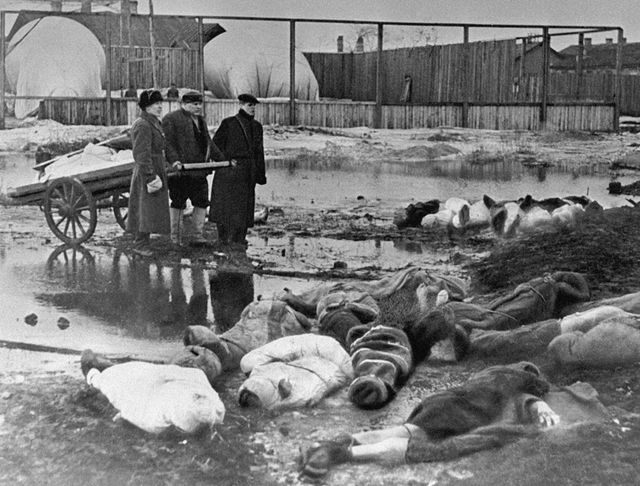 |
| The Volkovo cemetery |
Like hundreds of thousands of others, hunger forces Mukhina’s family to kill their house pet, a tomcat, in December. By the end of the year, all dogs, cats and even rats and mice have disappeared from Leningrad.
Most of the blocks of flats are unheated. The extreme cold and malnutrition lead to widespread deaths. In December, nearly 40,000 people die; in January and February 1943, the figure reaches almost 100,000 each month. By the summer of 1942, a further 150,000 people die. There are outbreaks of cannibalism.
Aka and Lena’s aunt also waste away in the winter. Aka, who is already 76 and completely worn out by hunger, dies on January 1, 1942.
Mukhina’s diary entries become more and more despairing.
On January 3, she angrily writes:
“We are dying like flies here because of the hunger, but yesterday Stalin gave another dinner in Moscow in honour of Eden [British Foreign Secretary Anthony Eden]. This is outrageous. They fill their bellies there, while we don’t even get a piece of bread. They play host at all sorts of brilliant receptions, while we live like cavemen, like blind moles.” [pp. 187-88]
Mukhina’s aunt dies in early February. She is desperate and on the point of dying from starvation. Only her aunt’s food cards, which she is able to continue using, enable her to survive.
Almost entirely on her own, Mukhina now makes plans to escape from Leningrad over the “road of life,” Lake Ladoga. She intends to go and live with relatives in Moscow.
By April, more than half a million people are evacuated over Lake Ladoga. Mukhina manages the escape probably around the end of May. Her diary suddenly ends on May 25.
From 1943, following the victory at Stalingrad, the Red Army was able to strike back at the Wehrmacht with several offensives, including one at Leningrad. However, the city was not completely liberated until January 27, 1944. By then, every third citizen of Leningrad had been killed and over a million Red Army soldiers had fallen in defence of the city.
After the war, Mukhina was unable—as she had once wished—to continue her education. She underwent training and worked at different factories. Like many survivors of the blockade, she suffered from serious medical problems for the rest of her life. She died in 1991, a few months before the Stalinist bureaucracy’s dissolution of the Soviet Union.
The high casualty figures of the blockade were anything but an unintended byproduct of the war. Rather, the extermination of the population in and around Leningrad was an integral part of the Nazis’ so-called “Master Plan East” [Generalplan Ost], on which the war of annihilation against the Soviet Union was based.>>>MORE FROM SOURCE<<<
Wednesday, June 4, 2014
The rise and rise of Golden Dawn
ekathimerini.com | The rise and rise of Golden Dawn
By Harry van Versendaal
With its leadership awaiting trial for a series of alleged felonies, why would someone vote for Golden Dawn?
“Golden Dawn is changing. To me, as a voter, there are clear signs of political maturity. The party is moving away from what used to be its core ideology; it’s not about kicking and punching immigrants anymore,” says Thodoris, a mild-mannered 45-year-old civil servant a few days after the far-right party gained seats in the European Parliament for the first time in its history.
“A growing number of people are joining out of patriotism and concern about national issues like illegal immigration. If you attend a party rally, you won't see skinheads but ordinary people like me.”
Thodoris, who lives in the seaside resort town of Porto Rafti, east of Athens, says he initially voted for the anti-immigrant, ultranationalist and Holocaust-denying group in 2012, mainly to protest the way Greece’s two mainstream parties were handling the debt crisis. But at last month's European Parliament elections, the former PASOK supporter – who did not wish to give his last name – says he had extra reasons to do so.
Tuesday, June 3, 2014
The BBC: Masters of Black Propaganda! « Socio-Economics History Blog
The BBC: Masters of Black Propaganda! « Socio-Economics History Blog
The BBC: Masters of Black Propaganda!
Video: UK Man Wins Court Case Against BBC For 9-11 WTC 7 Cover Up!
- The BBC: Masters of Black Propaganda!
by Dr. David Halpin, http://www.globalresearch.ca/
‘Nation shall Speak Truth unto Nation’ – The Ironic BBC motto.“BBC News is the department of the BBC responsible for the gathering and broadcasting of news and current affairs. The department is the world’s largest broadcast news organisation and generates about 120 hours of radio and television output every day, as well as online news coverage at bbc.co.uk/news. The service maintains 44 foreign news bureaux and has correspondents in almost all the world’s 240 countries.” (BBC)
-The BBC started broadcasting as the British Broadcasting Company in 1922. Its call sign became ‘London calling’ and London it was with its wealth of colonial wile and the stamp of its military. Reith, the seventh child of a Presbyterian minister, founded it. An Archbishop of Canterbury, Dr Cosmo Lang told Reith: ‘Whoever holds your job is, or should be, the most influential man in the country.’ The illusion of democracy provided by the House of Commons and the Cabinet depends greatly on the all pervading influence of the BBC. There follow some examples among the multitude of ways the public mind is kept in ignorance or its prejudice massaged firmly.
Monday, June 2, 2014
Gov. John Kasich;dedicated Holocaust memorial today at Ohios' Statehouse
Libeskind’s design features a shattered Star of David symbolizing 6 million Jewish victims and a stone inscription recognizing “millions more, including prisoners of war, racial and ethnic minorities, freemasons, homosexuals, the mentally ill, the developmentally disabled and political dissidents who suffered under Nazi Germany.”
The warning at the ceremony came from Deborah Lipstadt, a professor at Emory University who has spent the past few years speaking out against “Holocaust deniers” who either insist the Holocaust did not happen, or argue it was greatly exaggerated.
She cited an example just last month in which a middle-schoolers in a Southern California district were asked to write a paper explaining if they believed the Holocaust was historical fact or was made up to stir public sympathy and reap financial gain. After massive opposition, the project was scuttled.
“The teachers were not insensitive; they were wrong,” Lipstadt said. “This is not a sensitivity case; it’s history.”
She called the memorial a “way station in a process of changing ‘never again’ to a reality...You should not, you cannot stop,” she urged the audience.
Leslie H. Wexner, founder of L Brands, quoted Irish philosopher Edmund Burke, “All that is necessary for the triumph of evil is for good men to do nothing. Clearly the governor, by recognizing the significance of the Holocaust, has done something,” Wexner said.
The Ohio Bicentennial bell was tolled 12 times for the 12 million killed, followed by a moment of silence and a candle-lighting ceremony. >>more<<
| Hitler's Christianity To deny the influence of Christianity on Hitler and its role in World War II, means that you must ignore history and forever bar yourself from understanding the source of German anti-Semitism and how the WWII atrocities occurred. By using historical evidence of Hitler's and his henchmen's own words, this section aims to show how mixing religion with politics can cause conflicts, not only against religion but against government and its people. This site, in no way, condones Nazism, Neo-Nazism, fascist governments, or anti-Semitism, but instead, warns against them.
|
Subscribe to:
Comments (Atom)
-
Under Satan's Sun by Bloody Hammers
-
By now, almost everyone has seen one of the semi-amusing videos of black teen mobs rampaging through a store . Maybe we’ve even see...
.jpg)
.jpg)


